astronaut
Latest
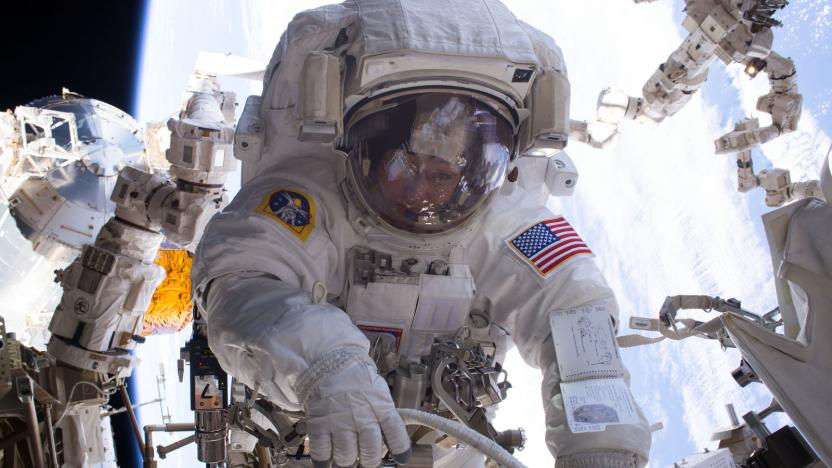
Watch astronaut Peggy Whitson's historic spacewalk
Dr. Peggy Whitson, the first woman to command the ISS, might soon also hold the record for the most spacewalks by a female astronaut. She's scheduled to step out of the ISS today (March 30th), and once she does, she'll have eclipsed the number of times current record holder Sunita Williams floated around in space outside the orbiting lab. Williams still holds the distinction of being the astronaut who fixed the ISS with a toothbrush, though.

Astronaut Jessica Meir will answer your questions on Tumblr
If you've got dreams of donning a spacesuit and going on trips outside the planet, don't miss Tumblr's Answer Time session today, March 11th. NASA's Jessica Meir will answer your questions starting at 4:30PM Eastern time, and it's a great chance to ask a real astronaut, especially if you missed Scott Kelly's Q&A session last year. Meir was part of the 21st NASA astronaut class in 2013 -- the first one that was 50 percent female -- and was cleared for actual missions in 2015, so you can ask her about what it's like to train for the job.

Moon mission will test an anti-radiation vest for astronauts
For astronauts headed to Mars, the biggest threat might not be an unforgiving climate or dwindling supplies -- it could be gamma ray radiation that gradually wrecks their bodies. Explorers may soon have a way to shield themselves, though. StemRad has revealed that its AstroRad anti-radiation vest is set to trialed aboard the Orion capsule when it orbits around the Moon during its late 2018 dry run. The non-metallic, layered shields are custom-fitted to each astronaut in order to protect their vital organs without bogging them down.
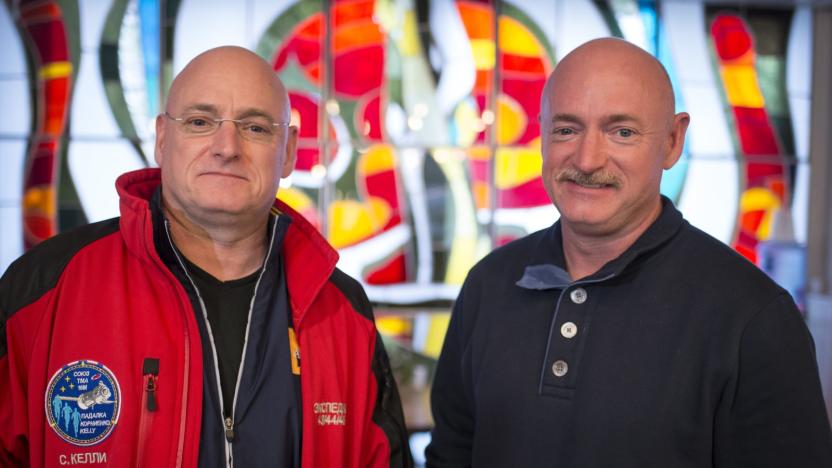
NASA studies astronaut twins to observe the rigors of space
When you spend nearly a year straight in space, you can expect NASA will want to conduct a good bit of research on you when you return to Earth. The space agency has been doing just that with astronaut Scott Kelly who was in orbit for 340 days. There's no one better to compare Kelly to than his twin brother and fellow astronaut Mark. NASA collected blood and other biological samples to look for any changes a long spaceflight may cause in the human body.

Boeing's spacesuit is light, cool and flexible
Virgin isn't the only company determined to make conventional spacesuits seem like ungainly beasts. Boeing has unveiled the spacesuit it wants to use for people aboard its Starliner CST-100 vessels, and they promise to be far more livable than the clunky spacewear you've seen before. It's roughly 40 percent lighter than previous suits, with layers that should keep astronauts cooler than usual. Wearers also won't feel quite so trapped or claustrophobic -- zippers help them transition from sitting to standing, and there's a wide plastic visor that should improve peripheral vision.

ICYMI: SpaceX redeems itself with a showstopper rocket launch
try{document.getElementById("aol-cms-player-1").style.display="none";}catch(e){}Today on In Case You Missed It: SpaceX is back in launching mode after the FAA grounded the company following an unfortunate explosion last September. The rocket company successfully launched satellites from its revamped Falcon9, then the motor completed its landing on a SpaceX floating pad.

NASA astronaut Gene Cernan passes away at age 82
NASA has continued its exploration of the moon since Apollo 17, but it has been over 40 years since one of its astronauts stepped on the surface. Gene Cernan was the second American to walk in space and the last set foot on the moon during that mission. Today, the retired US Navy captain died at age 82. During his time as an astronaut, Cernan logged over 500 hours in space and he spent more than 73 of those on the surface of the moon.
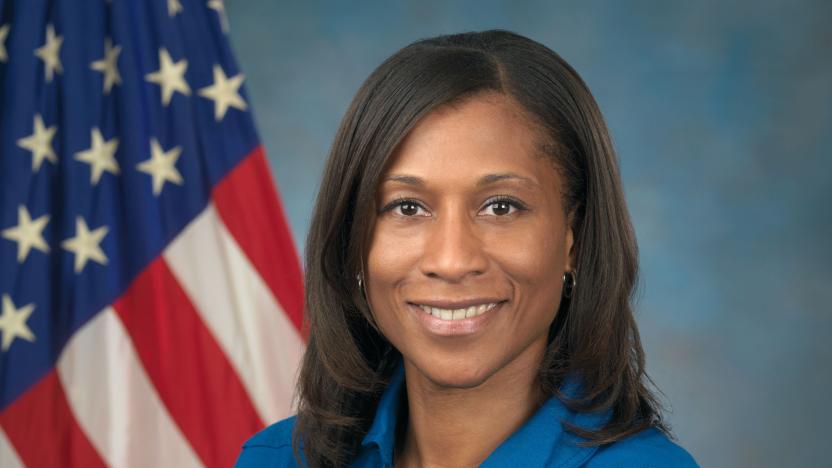
Space Station gets its first African-American crew member
The International Space Station may be in its twilight years, but that isn't precluding it from adding more to the history books. NASA has revealed that Jeanette Epps will be the first African-American ISS crew member when Expedition 56 reaches orbit in May 2018. It'll be the Syracuse-born astronaut's first spaceflight, but she has an extremely strong pedigree going in. On top of aerospace engineering and science degrees, she spent most of her pre-NASA career working as a CIA intelligence officer.
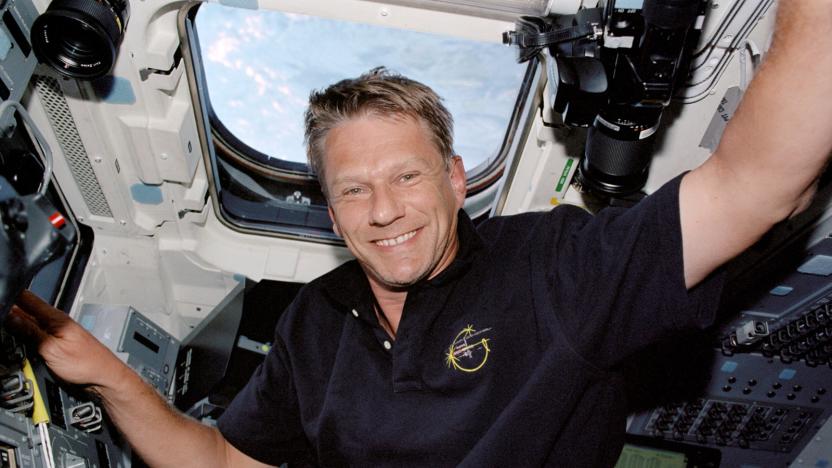
Astronaut and climate scientist Piers Sellers dies at 61
It's sad when humanity loses pioneering astronauts who claim important firsts, but it's equally tragic when we lose those astronauts who quietly accomplished a lot both in orbit and on the ground. And unfortunately, we just lost one: Piers Sellers, a NASA astronaut and climate scientist, has died of pancreatic cancer at the age of 61. You may not have heard of him, but the UK-born explorer was a major force in NASA for decades.

ICYMI: Godspeed to astronaut John Glenn
try{document.getElementById("aol-cms-player-1").style.display="none";}catch(e){}Today on In Case You Missed It: Astronaut and Senator John Glenn died this week at the age of 95 and we couldn't let the first American to orbit the Earth go without a look back at some of his greatest achievements. Meanwhile, MIT researchers were able to show that light therapy broke up Alzheimer's causing plaque in the brains of elderly mice; such promising work. Dinosaur fans will need to see this amber-encased dinosaur tail covered in feathers (not scales!). The tumor video is here. If you want to read up on the NSA phone call listening issue, that story is here. As always, please share any interesting tech or science videos you find by using the #ICYMI hashtag on Twitter for @mskerryd.

John Glenn, the first American to orbit the Earth, dies at 95
John Glenn, the legendary war veteran, astronaut and United States Senator, died this afternoon at the age of 95 after being hospitalized in his home state of Ohio. After serving as a combat pilot in World War II and the Korean War, Glenn became the first American to orbit the Earth in 1962. This feat came in the middle of the Cold War -- Russia had just achieved orbit itself and Glenn's trip evened out the space race between the two countries.

Watch crew leave the International Space Station at 4:45PM Eastern
It's always a momentous (if melancholic) moment when astronauts finish their stints aboard the International Space Station, and NASA is determined to capture every last minute of the occasion this time around. It's livestreaming the departure of astronauts Kate Rubins, Anatoly Ivanishin and Takuya Onishi as they end 115 days in orbit. Things get started in earnest today (October 29th) at 4:45PM Eastern, when the crew says its goodbye and enters the Soyuz spacecraft. The undocking should begin at 8:37PM, and the deorbit burn should start at 11:06PM. If all goes according to plan, the team will touch down on Earth at 11:59PM.

You can now own this old robot that helped NASA test space suits
Believe it or not, NASA used to utilize a decidedly creepy robot to test space suits meant for real-life astronauts.

Lockheed Martin hopes to turn your kids into astronauts
Lockheed Martin knows that its future spacecraft will only fly if there are enough people interested in flying them, so it's trying something a bit unusual: it's helping to raise the next wave of astronauts. It's launching a Generation Beyond program that gives both parents and teachers the resources they need to get middle school kids (grades 6 through 8) excited about space-related science, engineering and math. The internet curriculum shows would-be spacefarers everything from the challenges of living in space (or on Mars) to the careers they can pursue in space exploration.

Deep space travel might play havoc with your heart
Traveling deeper into space may carry some unanticipated health risks. Scientists have published a study noting that Apollo astronauts have died of heart disease at an unusually high rate -- of the 7 that passed away during the study, 43 percent fell to cardiovascular conditions. Only 11 percent of those deceased astronauts who stopped at low Earth orbit succumbed to heart disease, which is about on par with the 9 percent rate on the ground. There's a concern that the increased dose of radiation in deep space, however brief, is intense enough to mess with the functioning of cells that line blood vessels.
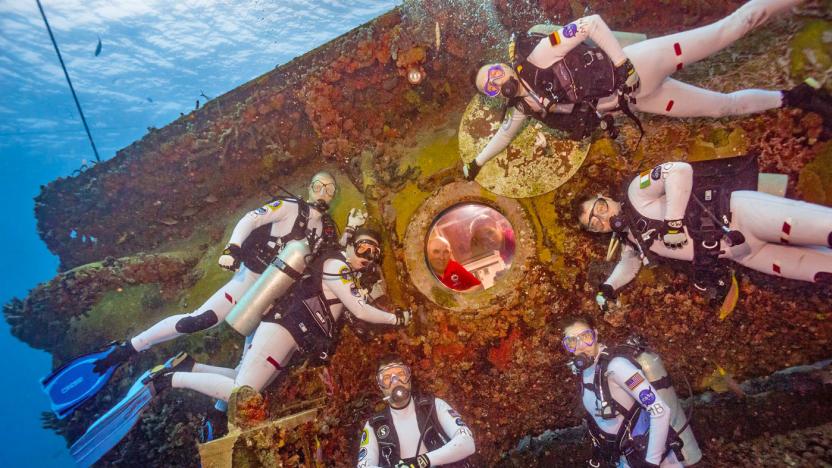
NASA astronauts head underwater to simulate Mars missions
Once a year, NASA's astronauts make a big change -- trading their vocation of conducting scientific experiments in space for one of underwater research. For the next two and a half weeks, an international team of 'Aquanauts' will be living on the ocean floor at NASA's Aquarius habitat off of the coast of Florida. As always, the NEEMO (NASA Extreme Environment Mission Operations) expedition will serve as a testing ground for new equipment. This year, it's also giving the team a taste of what it would be like to live on Mars.

NASA institute will find ways to protect astronauts' health
Lengthy deep space missions pose higher risks to spacefaring humans compared to trips to the ISS or to the moon -- after all, our bodies evolved for life on Earth. In an effort to find ways to reduce those risks, NASA has joined forces with the Baylor College of Medicine in Houston. The partners will operate a new institute, slated to begin its operations on October 1st, dedicated to developing ways to protect astronauts' health for long-duration missions.

NASA's Kate Rubins is set to sequence DNA aboard the ISS
The three newest ISS crew members are blasting off to space in a Soyuz from Kazakhstan tonight. Russia's space agency is sending out Anatoly Ivanishin, Japan's representative is Takuya Onishi, while NASA's is biologist-slash-astronaut Kate Rubins, who's slated to do some DNA sequencing aboard the station. Rubins told Wired that she's going to perform some of the first DNA sequencing on the ISS using the USB-sized MinION sequencer. The device was created by a UK company called Oxford Nanopore and costs only $1,000, whereas traditional sequencers could cost as much as a million.
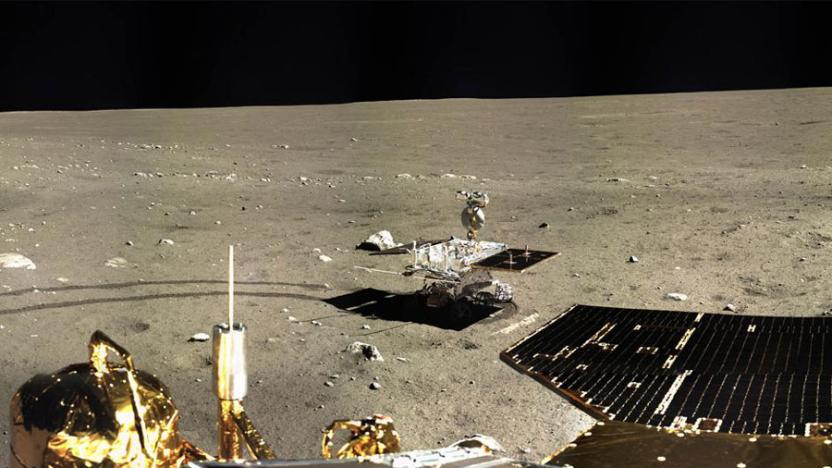
China wants to put a man on the moon by 2036
A senior Chinese official announced yet another ambitious plan for the space-faring nation at a press conference on Saturday. PLA Lt. Gen. Zhang Yulin -- who is also deputy commander of the China Manned Space Program -- told reporters that China plans to land an astronaut on the Moon by 2036. This announcement eclipses China's earlier claims that it will explore the dark side of the moon in 2018 and launch two new space stations (one this year, another in 2022). It already sent a rover to the moon in 2013. The country will reportedly use the next "15 to 20 years", according to Reuters, to build out the necessary infrastructure.

Astronaut Scott Kelly will answer questions from space on Tumblr
Scott Kelly, the NASA astronaut with a green thumb, is hosting Answer Time on Tumblr right from the ISS. What's "Answer Time," you ask? It's like Reddit's AMA where the host fields questions from readers, so if you missed Kelly's AMA earlier this year, now's your chance. Here's a short background on Kelly, in case you're still thinking of what to ask: he's known as the American who has spent the most time in space and is currently on a year-long mission aboard the ISS.







